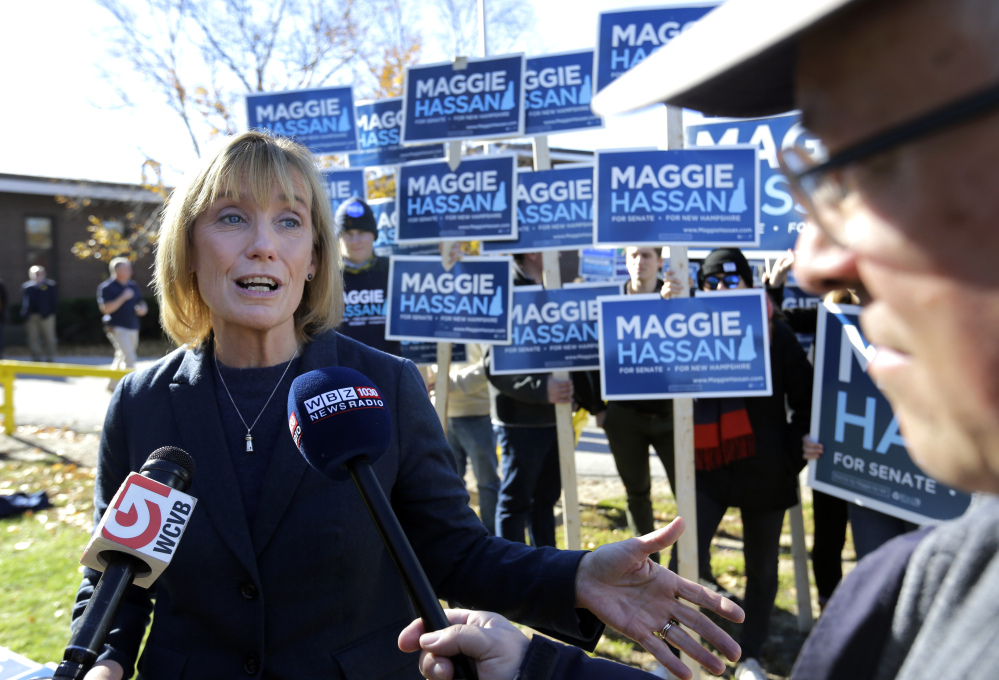CONCORD, N.H. – Democratic Gov. Maggie Hassan officially becomes a U.S. senator on Tuesday, ending four years of leading New Hampshire from her corner office.
Her two terms in office were marked by accomplishments, including providing subsidized health care to 50,000 low-income people, and by failures, such as her unsuccessful drive to legalize a casino.
Perhaps the greatest challenge that faced Hassan was the opioid and heroin crisis, which the state has struggled to contain.
WINS
Passing and reauthorizing Medicaid expansion with Republicans’ help stands as one of Hassan’s top accomplishments. A piece of the Affordable Care Act, Medicaid expansion has allowed about 50,000 low-income New Hampshire people to receive subsidized health care. That insurance covers substance abuse treatment, offering an added benefit for people struggling with addiction. But the incoming Republican administrations in Concord and Washington could jeopardize this key piece of Hassan’s legacy.
Hassan’s first budget restored deep cuts to the university system made during Republicans’ reign in 2011 and 2012. Her budgets lowered tuition at the community college system and froze it at state universities in some years.
New Hampshire’s economy also made gains under Hassan, closing out 2016 with the nation’s lowest unemployment rate.
LOSSES
Hassan was a staunch advocate for legalizing the building of one casino in New Hampshire when she first took office in 2013. She and longtime casino advocates argued it would provide needed revenue. But her efforts ultimately failed, requiring a rejiggering of a budget plan that relied on tens of millions in casino revenue and disappointing gambling advocates.
Hassan also lost out on an $8.3 million job training program, the major initiative outlined in her 2016 State of the State address. Republican lawmakers never approved it.
MIXED RESULTS
Hassan vetoed the budget in 2015, causing a three-month stalemate that resulted in uncertainty and a delay in money going out to certain agencies and initiatives. Hassan vetoed the plan over concerns about business taxes and other items. The final product made slight changes that Hassan’s allies say helped ensure the budget was structurally sound. Her detractors say the budget veto was a partisan move that needlessly delayed state services.
Both of Hassan’s budgets passed without major tax or fee increases, but those wouldn’t have passed through the Legislature anyway.
Hassan’s work on the opioid crisis is similarly hard to characterize as a success or failure. Deaths from heroin and other opioids numbered 193 in 2013. This year, it’s expected to near 500, giving New Hampshire the nation’s biggest spike in deaths. Hassan and lawmakers got serious about the crisis over the past year, passing bills to provide more money for treatment programs, beefing up law enforcement and making it easier to access the overdose reversal drug naloxone.
The overall effectiveness of these measures is yet to be determined.
Send questions/comments to the editors.



Success. Please wait for the page to reload. If the page does not reload within 5 seconds, please refresh the page.
Enter your email and password to access comments.
Hi, to comment on stories you must . This profile is in addition to your subscription and website login.
Already have a commenting profile? .
Invalid username/password.
Please check your email to confirm and complete your registration.
Only subscribers are eligible to post comments. Please subscribe or login first for digital access. Here’s why.
Use the form below to reset your password. When you've submitted your account email, we will send an email with a reset code.